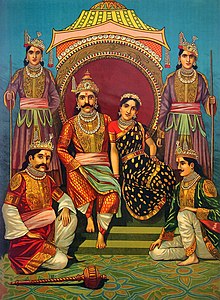Pandava


The Pandavas ( Sanskrit पाण्डव Pāṇḍava Sg. ) Are the five sons of King Pandu with his two wives Kunti and Madri in the Indian epic Mahabharata . The descendants of his first wife Kunti are Yudhishthira , Arjuna and Bhima . With Madri he is the foster father of the twins Nakula and Sahadeva . After Pandu's death, all five Pandavas, along with their cousins, the Kauravas , were raised by their blind uncle Dhritarashtra . They had older rights to the throne, but these were not recognized by Dhritarashtra and his eldest son Duryodhana .
myth
Due to a curse, Pandu was unable to procreate and therefore, at his request, the gods should be the fathers of his sons. This descent becomes clear in the essence of the five Pandavas, because they have differently pronounced character traits: Yudhishthira is considered to be just and truthful, since his father is Yama , the Dharma personified ; Bhima, famous for his strength and appetite, comes from the wind god Vayu and is thus a brother of the monkey-headed Hanuman ; Arjuna, the great archer and fighter, owes his skills to the descent of Indra ; Nakula and Sahadeva, the two youngest, are excellent horsemen, a skill they received from their divine fathers, the Ashvin twins. All five grew up under the care of Kunti after Madri voluntarily followed the late husband Pandu into death.
The five brothers have several wives, although they are all married to Princess Draupadi . So Arjuna has five wives, including Krishna's sister Subhadra . After losing a game of dice, everyone goes into exile for 13 years.
Of the numerous cities founded or visited by the five brothers, five are mentioned by name that are said to still exist today: Indraprastha ( Delhi ), Panprastha (Panipat), Sonprastha (Sonipat), Tilprastha (Tilpat) and Vyagprastha (Bagpat )
In the battle of Kurukshetra , the Pandavas fight their hundred cousins, the Kauravas. On their side they have the help of Krishna , the Kauravas the army of Krishna as well as all the honored teachers of the two families and the most powerful warriors. Before the beginning of the final battle in Kurukshetra , Krishna as a charioteer explains to his student and friend Arjuna the right attitude of a warrior chosen by God and reveals to him the work of the Supreme Divinity. This part of the Mahabharata is called Bhagavad-Gita - the 'song of the sublime'.
After the battle of Kurukshetra, Yudhishthira is crowned the new king. At the end of the Mahabharata he alone is granted entry into heaven in his human form, and only after a further examination does the union with his loved ones follow there.
See also
literature
- Mahabharata , Diederichs, Cologne 1986, ISBN 3-424-00576-2 .
